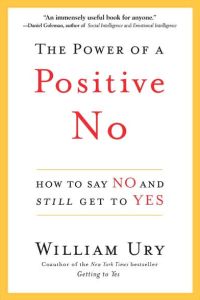Join getAbstract to access the summary!

Join getAbstract to access the summary!
William Ury
The Power of a Positive No
How to Say No and Still Get to Yes
Bantam Dell, 2007
What's inside?
Great managers and negotiators can say no so that it sounds like yes– and that’s an indispensable skill.
Recommendation
Imagine that you are a police department’s hostage negotiator. An armed man who has just lost his job is holding his wife and children hostage in their barricaded home. He threatens to kill his family and himself unless the authorities turn over the boss who fired him so he can “administer fiery justice.” How do you tell this potential murderer no without jeopardizing everyone in the house? The professionals who negotiate during such extreme situations know how to refuse in such a way that no one gets hurt. That’s a useful skill, even when lives are not at stake. William Ury, head of Harvard’s Global Negotiation Project, has negotiated agreements that have ended bloody conflicts around the world. Here, he outlines a nimble strategy for delivering a “Positive No” in every situation. This approach enables you to be firm about your values and state your opinions without alienating others. getAbstract suggests this book to anyone who has to deliver an occasional no and make it stick.
Summary
About the Author
William Ury heads Harvard University’s Global Negotiation Project. He is the co-author of Getting to Yes, and a leader in the global “e-Parliament,” designed to advance democracy by developing an ongoing international forum to address global problems.





















Comment on this summary